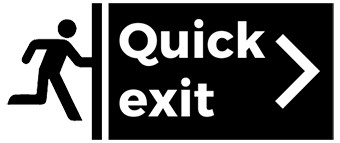Government of New Brunswick
Frequently Asked Questions
with regard to Services
Services available to the public can include:
- Public services, such as provincial/municipal government departments, schools, libraries, city hall, and hospitals etc.
- Private sector service providers, such as restaurants, shopping malls, universities/colleges and non-profit organizations.
Conduct may be found to be non-discriminatory if the service provider or housing provider can show that the limitation, specification or preference is based upon a bona fide (“in good faith”) qualification (BFQ).
In order to be a BFQ the standard adopted by the organization must pass the “Meiorin Test”. This three-part test requires that the employer, service provider or housing provider establish that the standard:
- Was adopted for a purpose or goal that is rationally connected to the function being performed;
- Was adopted in good faith, in the belief that it is necessary for the fulfillment of the purpose or goal; and
- Is reasonably necessary to accomplish its purpose or goal, in the sense that the employer, service provider or housing provider cannot accommodate persons with the characteristics of the person without incurring undue hardship.
The third part of the test requires that the employer, service provider or housing provider individually assess the needs of the person with a service animal to determine whether it is possible to accommodate the person without incurring undue hardship.
Yes. An individual can request personal care based on their sex. The service provider has a duty to provide reasonable accommodation to the patient or client. The duty to accommodate the client outweighs the rights employees.
No. A service provider could not ask only high school students to remove their back packs, but a service provider could set a general rule applicable to all customers or clients.
No. A service provider could set a limit on number of clients allowed in a store as long as it is applied equally to everyone.
Yes. They still have a duty to accommodate the student up to the point of undue hardship.
The school has a duty to accommodate the student up to the point of undue hardship. Should the accommodation not reduce or eliminate the violent/disruptive behaviour then the school may reach a point of undue hardship.
Yes. A trans person may seek accommodation with respect to a washroom or change facility if they are not comfortable using one of the available men’s or women’s washrooms. Possible accommodations could include providing access to a single-stall washroom that may not normally be available. However, a trans person cannot be required to use a separate washroom or change facility from everyone else if they wish to use the one that corresponds to their gender identity.
See our guideline.
Students have an obligation to inform their post-secondary institution of the need for accommodation. As students are entitled to privacy, there is no requirement to disclose the specific disability to the education provider. The provider may require students to provide a letter from a medical professional outlining the student’s functional impairment or capabilities and the type of accommodation required, but it is unnecessary for the letter to include a diagnosis of the disability.
Service providers cannot prohibit breastfeeding or limit someone’s ability to breastfeed.
a. Do they have to provide them in male washrooms and not just female washrooms?
Service providers should provide changing stations in both male and female washrooms or have reasonable alternative.
Yes they do, although there could be health and safety exceptions, for example, in the restaurant’s kitchen.
Generally, they cannot refuse entry, but they may argue that it is a preference based on a bona fide requirement or qualification. Issues could arise such as health and safety concerns.
In addition, hotels would have to establish a bona fide qualification to refuse entry.
a. Can they require that the service animal be on a leash?
A service animal must be under the care and control of their handler at all times (e.g. harnessed, leashed or tethered) unless doing so interferes with the work or task that it performs. If a person’s disability prevents maintaining physical control of the animal, the person must still maintain control of the animal through voice, signal or other means.
Restaurants are able to have children and senior menus however all patrons should be able to access it if the restaurant is unable to establish a bona fide qualification for having the special menu.
A person could conceivably file a complaint based on this situation, but an establishment could argue that it is a preference based on a bona fide qualification.
Generally no, but it may depend on various factors including liquor licensing and type of establishment.
Generally no, but they may argue that it is a preference based on a bona fide requirement or qualification. They would have to establish a bona fide qualification for denying access to minors.
No it is not. They could be cats, horses, monkeys, birds, etc. Please refer to Service Animal Guidelines for additional information.
Possibly. The school can make an argument that the accommodations are reasonable. Students have access to reasonable and not perfect accommodation.
Generally no, but it may depend on various factors including liquor licensing and type of event.
Generally no, but this is subject to the age of majority exception under Section 6.3 of the NB Human Rights Act, or if there is a bona fide requirement or qualification.
It is also possible if it is a required or authorized by an Act of the Legislature or if the Commission, pursuant to section 14 of the Act, has determined it is a special program or has approved a special program.
Under the Act, level of income is not specifically a ground that is covered. The ground of social condition only covers the source of income, occupation or level of education. However, the grounds of marital status and family status are protected and such a program could have an adverse affect on these individuals based on their level of income.
Prior to may 5, 2017, there was no age exemption for age discrimination in services. However, on May 5, 2017, the Act was amended to include a bfq for age discrimination with respect to services. Consequently, an insurance provider can raise the age exemption for excluding certain individuals based on their age or pre-existing condition(s).
Both the service provider and the landlord. The obligations are to the point of undue hardship. The service provider should consider the location of its business to ensure it is accessible to the clients. The landlord should consider making those changes that are necessary and possible to the building to make it accessible.
Your obligations are to the point of undue hardship. You may experience difficulty modifying the building to make it accessible due to your obligations with regard to contracts, covenants, or bylaws, etc. However, the Act supersedes other obligations and New Brunswick legislation. Therefore, your obligations under the Act must be met.
Yes, as long as the behaviour is discriminatory based on of the protected grounds as intent does not matter.
It will depend on the service provider and/or the service being provided. A service provider must never deny a service based on ancestry or national origin unless they can establish a bfq or a special program.
Examples: a food bank Is not able to deny service to a First Nation person by maintaining that their band is providing that service unless the food bank only serves a specific disadvantaged group and they are able to establish a special program; a food bank that provides services to everyone is unable to refuse service based on ancestry or national origin.
You have a duty to accommodate the employee as well as the customer. You can request medical documentation from the employee regarding their disability and work with the employee to see what accommodation is required. You many need to work out a schedule with the employee and the customer where they are not in the facility at the same time.
It is encouraged, but it may not be a requirement unless an employee or customer requires it. If an employee or customer requires it, then you would have a duty to accommodate.
For example, a car rental company should provide a scent free car when requested, up to the point of undue hardship.
Not necessarily. Depending upon the institution (pre-school, school, postsecondary, etc.), you may have a duty to inquire if they require accommodation. In the postsecondary institution, the student has an obligation to advise the institution that they are encountering difficulty based on a disability or require accommodation. If a disability is causing the struggle, accommodation may be required.

